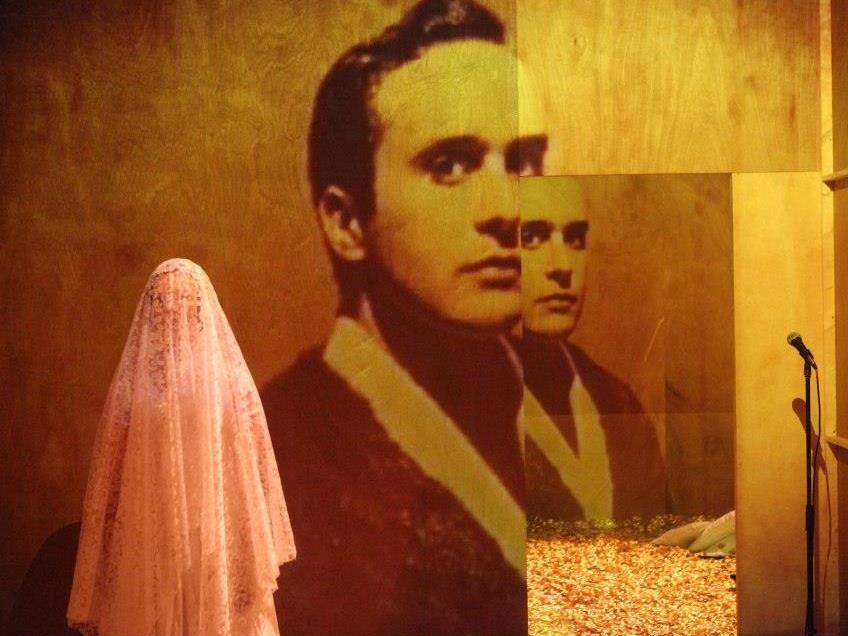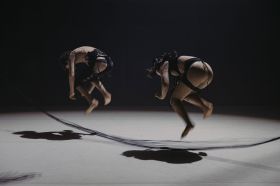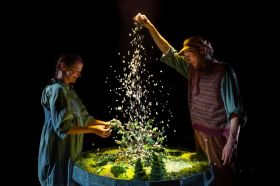Image: The Rabble’s Room of Regret. Photographer: Marg Horwell.
The story is well-known: Dorian (Pier Carthew) wishes that a sublime portrait of him, painted by his friend Basil Hallward (David Harrison), would age and wither in his place, while Dorian retains his youth and good looks. He gets his wish, but under the influence of another friend, the decadent Lord Henry Wotton (Mary Helen Sassman), Dorian succumbs to a life of vice, and the portrait grows increasingly hideous in correspondence with his spiritual downfall. Years later, Dorian destroys the painting in a fit of remorse, killing himself in the process.
Theatre company The Rabble has taken this familiar story, turned it inside out and produced something new and startling, true to the spirit of the original but also utterly contemporary. Part performance, part art installation, it is a meticulously choreographed, fully immersive theatre experience.
Audience members are placed throughout the multiple rooms of its extraordinary set, becoming part of the décor themselves. Certain scenes are played repeatedly, with variations, in the different rooms. As the play progresses, the original text is left further and further behind, its ideas embodied with escalating, visceral intensity until the final scene which is played out in almost complete silence. Conspicuously absent are the famously witty epigrams which characterise Wilde’s own plays; this is a work addressing, not the frothy social satire for which the writer is best known, but rather the underlying obsessions of his life and work.
The Picture of Dorian Gray’s biographical background is probably almost as well-known as its plot. It is a thinly veiled allegory for Wilde’s homosexuality, with Dorian’s locked-away portrait standing in for Wilde’s own ‘secret shame’. Censored by publishers before printing, it was still condemned for indecency and immorality when it first appeared and marked the beginning of Wilde’s own downfall, which culminated in his imprisonment for ‘homosexual offences’ and death in impoverished exile a mere six years later.
Show creators Emma Valente and Kate Davis connect Wilde’s deep inner conflict, self-loathing and subsequent persecution, to more modern forms of anti-gay prejudice and violence. They capture the horror and tragedy of the book, but also its aesthetic delights, its celebration of beauty and philosophy of sensual pleasure as life’s ultimate aim.
Every member of the cast demonstrates impressive discipline and total commitment to this complicated and challenging production, but for me the standout performance is Harrison as Basil Hallward. His declaration of love for Dorian, taken verbatim from the novel, cuts through the play’s arch irony and deliberate artificiality in a moment of affecting, heartfelt sincerity.
Room of Regret is haunting, thought-provoking, daring, irreverent, bawdy and poignant. Having seen it, I was compelled to immediately reread The Picture of Dorian Gray, and found my understanding and enjoyment of the novel greatly enhanced. There can be no higher praise for an adaptation than that.
Rating: 5 out of 5 stars
Room of Regret
Based on the novel by Oscar Wilde
Created by Emma Valente and Kate Davis
Directed by Emma Valente
Performed by Pier Carthew, Alex McQueen, Mary Helen Sassman, David Harrison, Emily Milledge
Theatre Works, St Kilda
21 October – 3 November
Melbourne Festival
www.melbournefestival.com.au
11-27 October






